- Србија
Упознајте Србију
- Грађани
Образовање
Култура и наука
Здравство
- Посао
Запошљавање
Привредна клима
- Медији
- Влада
Влада Републике Србије
- Контакт
Будимо у контакту
Контакт форма
Назад
Будимоу контакту
Било да имате питање, коментар, сугестију или било какав проблем који је у оквиру надлежности Владе, пошаљите нам своју поруку и потрудићемо се да вам одговоримо у најкраћем року. Уколико ваш проблем излази из оквира наших овлашћења, проследићемо поруку надлежној институцији.
П:
О:
Читај ми
Председник и премијер Македоније у незваничној посети Београду
Београд,
5. август 2004.
На позив председника Владе Републике Србије Војислава Коштунице сутра ће у незваничну посету Београду допутовати председник и премијер Македоније, Бранко Црвенковски и Хари Костов.
Током боравка у Београду, Црвенковски и Костов присуствоваће, заједно са председником Србије Борисом Тадићем и председником Владе Војиславом Коштуницом, пријатељској кошаркашкој утакмици између Србије и Црне Горе и Сједињених Америчких Држава.
Посета је договорена у понедељак, 2. августа, током прославе 60 година АСНОМ-а и представља потврду добрих и пријатељских међусобних односа.
Посета је договорена у понедељак, 2. августа, током прославе 60 година АСНОМ-а и представља потврду добрих и пријатељских међусобних односа.
-
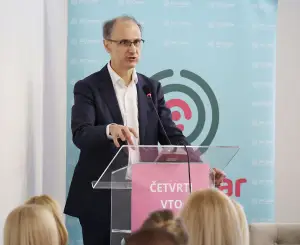 Београд, 15. новембар 2025.
Београд, 15. новембар 2025.Тема инфертилитета од високог значаја за свако друштво
-
 Београд, 14. новембар 2025.
Београд, 14. новембар 2025.Србија опредељена за јачање партнерства и сарадње са Уједињеним...
-
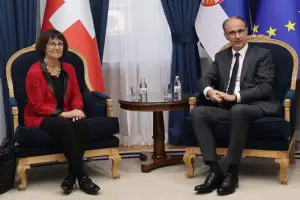 Београд, 13. новембар 2025.
Београд, 13. новембар 2025.Швајцарска искуства у области дуалног образовања корисна за...
-
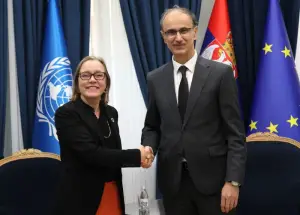 Београд, 13. новембар 2025.
Београд, 13. новембар 2025.Видљиви резултати партнерства Србије и УН у многим областима
-
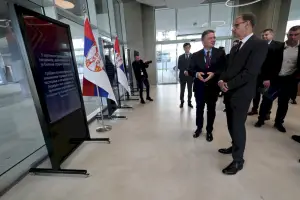 Београд, 13. новембар 2025.
Београд, 13. новембар 2025.Систем „е-Боловање – Послодавацˮ још један корак у...
-
 Београд, 12. новембар 2025.
Београд, 12. новембар 2025.Србија опредељена за даљи развој сарадње са Државом Палестином
-
 Београд, 12. новембар 2025.
Београд, 12. новембар 2025.Историјска блискост Србије и Кипра темељ унапређења економске...
-
 Београд, 12. новембар 2025.
Београд, 12. новембар 2025.Пуноправно чланство у ЕУ и очување националних интереса јасни...
-
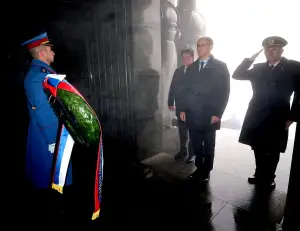 Београд, 11. новембар 2025.
Београд, 11. новембар 2025.Премијер Мацут полoжио венац на Споменик незнаном јунаку на Авали
-
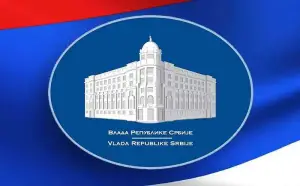 Београд, 8. новембар 2025.
Београд, 8. новембар 2025.Премијер разговарао са проректорима и деканима факултета...
